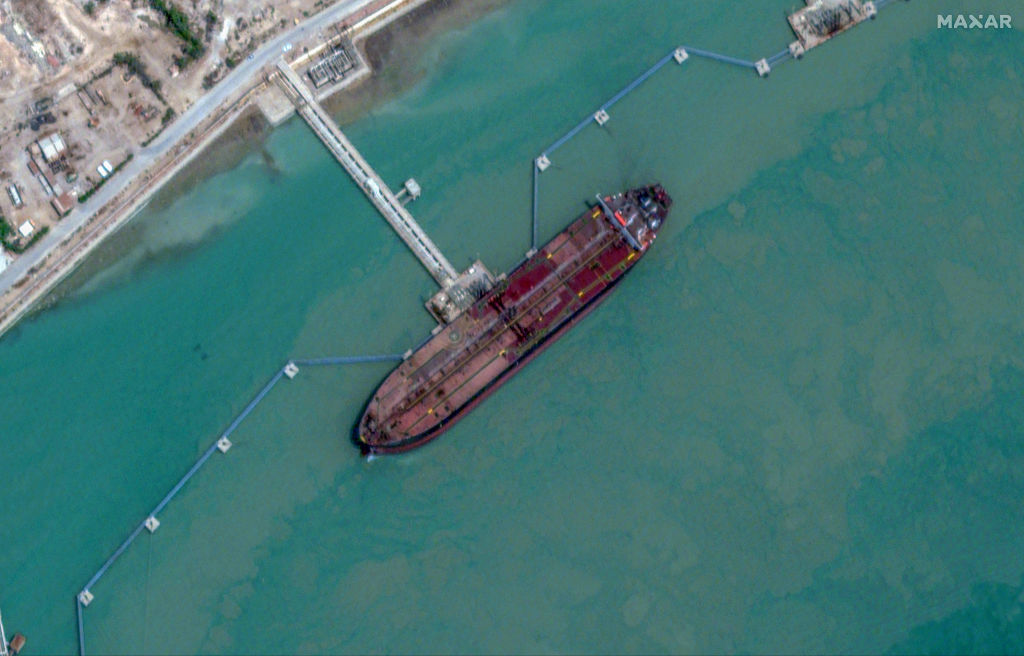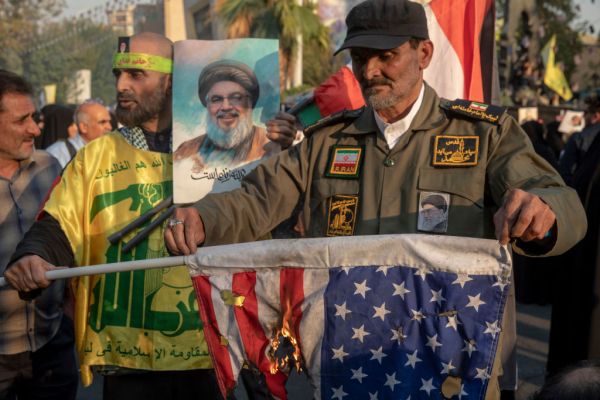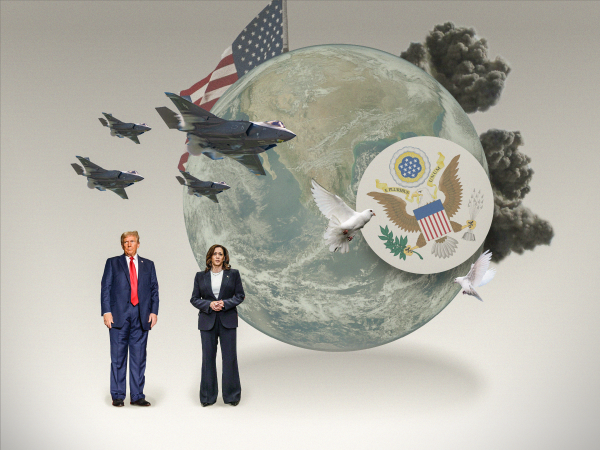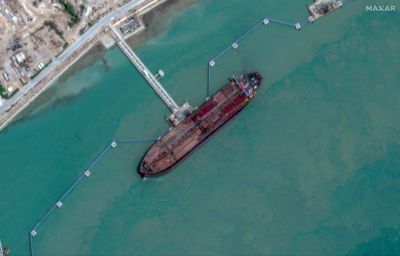Happy Thursday! Remember, if you like what we’re doing here and want to give your friends and family a taste of what we’re up to, we’re giving each member five guest passes in honor of The Dispatch’s fifth birthday! With less than three weeks to the election—shudder—gift your loved ones some news they can trust.
Click here to generate your guest passes!
Quick Hits: Today’s Top Stories
- The Israeli government agency tasked with delivering humanitarian aid—the Coalition of Government Activities in the Territories—announced on Wednesday that it allowed for the passage of aid directly into the northern Gaza Strip, including fuel, food, shelter equipment, hygiene products, and baby formula. The announcement comes one day after U.S. State Department spokesman Matthew Miller confirmed that the Biden administration demanded Israel allow more supplies into Gaza and improve conditions for the region’s civilians. Several media outlets reported earlier this week that the Biden administration would consider cutting military aid to Israel if its concerns were not addressed.
- Meanwhile, the Israel Defense Forces (IDF) said on Wednesday it struck Hezbollah targets—including military headquarters and munitions storage facilities—in an airstrike on the southern Lebanese city of Nabatieh. Lebanese officials said the airstrike destroyed local municipal buildings, killing 16 people, including the mayor, and injuring more than 50 others. The IDF said Hezbollah militants intentionally stationed their infrastructure near civilian buildings, “using the civilian population as a human shield.”
- The Biden administration on Tuesday unveiled new sanctions against three individuals and four companies linked to a sanctions evasion network that helps channel funds to Hezbollah, the Iran-backed terrorist group based in Lebanon. In addition, the U.S. sanctioned three people involved in the illegal production and trafficking of Captagon—a highly addictive psychoactive amphetamine—that provides funding for entities including Hezbollah and Bashar al-Assad’s regime in Syria.
- Ukrainian President Volodymyr Zelensky on Wednesday presented to the country’s parliament his “victory plan,” which he said is designed to strengthen Ukraine’s standing in the war and bring about a negotiated peace deal with Russia on terms amicable to Ukraine. Zelensky outlined five key points that include Ukraine’s eventual invitation to join NATO and strengthening the country’s defenses against Russian military action, though details remain sparse. Also on Wednesday, President Joe Biden announced $425 million in military assistance to Ukraine, including air defenses, armored vehicles, and munitions “to meet Ukraine’s urgent needs,” the White House said.
- The U.S. Navy said Wednesday that a fighter jet crashed just after 3 p.m. on Tuesday near Washington state’s Mt. Rainier during a training flight. The jet’s two crew members—whose conditions are unknown—were still missing as search and rescue operations continued Wednesday. While the Navy has pinpointed the site where the EA-18G Growler aircraft—a variant of the F/A-18 Super Hornet—crashed, teams have been unable to reach the location because of “mountainous terrain, cloudy weather, and low visibility.” Navy officials are still investigating the cause of the crash.
- A fuel tanker overturned, spilling fuel that exploded late Tuesday night in northern Nigeria, killing at least 153 people and injuring some 100 others. Local police said they attempted to block off the area where the fuel had leaked prior to the explosion but were overwhelmed by a large crowd attempting to recover the spilled gasoline.
- The Italian parliament on Wednesday passed a bill making it illegal for Italian citizens to seek a surrogate abroad, extending a surrogacy ban inside the country that has been in place since 2004. Now, Italian nationals who have a surrogate child in foreign countries where such practices are legal—like the U.S.—could face criminal penalties. Italian Prime Minister Giorgia Meloni tweeted her approval, calling the bill “a common sense rule against the commodification of the female body and children.”
- Vice President Kamala Harris sought to put distance between herself and President Joe Biden in a combative interview Wednesday night with Fox News’ Bret Baier. “My presidency will not be a continuation of Joe Biden’s presidency, and like every new president that comes into office, I will bring my life experiences, my professional experiences, and fresh and new ideas,” she said. During the roughly half-hour exchange that often turned tense, Baier particularly pressed Harris on immigration, and she repeatedly pivoted to former President Donald Trump’s opposition to the bipartisan immigration bill that failed earlier this year.
- Amazon on Wednesday announced that it had reached agreements with three energy companies in three states to invest in developing nuclear power projects via small modular reactors (SMRs). Although SMRs—miniature nuclear power plants—produce about one-third the energy of traditional reactors, the smaller design helps keep down construction and maintenance costs. Google on Tuesday announced a similar deal to purchase SMR-generated nuclear energy from the company Kairos Power. There are not yet any active SMRs in the U.S., and both companies do not expect the SMRs to be functional until 2030 at the earliest.
- The Federal Trade Commission on Wednesday voted 3-2 to finalize a rule requiring companies to provide a “simple mechanism” to cancel paid subscriptions and memberships. The “click-to-cancel” rule—scheduled to go into effect 180 days after publication in the Federal Register—mandates that canceling a subscription be “as easy” for consumers as it was to first subscribe. The regulatory decision was quickly criticized by the U.S. Chamber of Commerce, a business advocacy group. “Imposing heavy-handed regulations that micromanage business practices and pricing is the wrong approach, inevitably raising costs for consumers,” said the group’s executive vice president, Neil Bradley.
- Nebraska’s Supreme Court on Wednesday upheld a state law passed in April that restored voter eligibility to convicted felons who have completed their sentences. In July, Nebraska Secretary of State Bob Evnen ordered local election officials to take previously convicted felons off of voter registries—in contravention of the state law—citing Nebraska Attorney General Mike Hilgers’ opinion arguing the law violated the Nebraska constitution. However, the state Supreme Court did not find the law unconstitutional, and ordered that Evnen reverse his July decision.
Going After Iran’s Ghost Fleet

Last week, the U.S. Treasury and State Departments announced new sanctions that represent the latest salvo in their fight against so-called “ghost fleets.” And that’s not a reference to Davy Jones or the Flying Dutchman.
Rather, the Biden administration slapped penalties on vessels and companies associated with the Iranian government that have enabled an illicit and far-reaching trade in oil to help fund the Islamic Republic’s nuclear program and proxy military forces throughout the Middle East.
The “ghost fleet” phenomenon—and the black market it enables—points to the larger success of Iran, Russia, China, and other Western adversaries in working together to evade economic sanctions. Their increased collaboration in this effort is an enduring foreign policy challenge for the U.S.—and indeed for the next president.
The U.S. and its allies have tried to choke off Iran’s oil exports, which provide revenue to fuel the regime’s activity at home and across the region. U.S., European Union, and United Nations sanctions target Iran’s oil and gas exports and its petrochemical industry and also cut Tehran off from the global banking system—largely excluding it from making international money transfers or accessing foreign reserves. The Trump administration imposed most of these sanctions in 2018 after the U.S. withdrew from the Joint Comprehensive Plan of Action (JCPOA), an Obama-era agreement lifting sanctions on Iran in return for limiting its nuclear program.
The Biden administration has, for the most part, continued with these unilateral penalties, although critics accuse President Joe Biden of lax enforcement. Early in Biden’s presidency, the administration seemed to be inching toward renewing a nuclear deal with Iran—with sensitive negotiations perhaps putting a damper on aggressive sanctions enforcement. Later, others suggested the administration was avoiding fully enforcing the existing sanctions for fear such moves would raise commodity prices during a period of high inflation.
The Iranian regime is almost entirely dependent on its oil production: Up to 70 percent of the government’s revenue comes from oil exports—and those numbers have been rising, perhaps in part because the regime is figuring out how to avoid getting caught in the sanctions web. In 2019, oil production sat at less than 2 million barrels of oil a day, but by 2023, that figure had gone up to 3.5 million, representing an increase of roughly $40 billion in total revenue and record levels of total production.
Despite the West’s efforts, Iran has managed to sidestep sanctions with a scheme that sounds like something out of a Tom Clancy novel. “Iran’s ghost fleet, as well as a whole host of black market forces, are what allows the Islamic Republic to earn revenues from two critical sources even while being subject to sanctions—and those sources are crude oil sales and petrochemical sales,” Behnam Ben Taleblu, a senior fellow at the Foundation for Defense of Democracies, told TMD.
How does a ghost fleet work? The normal process for transporting oil by cargo freight is fairly straightforward. All cargo ships are registered—or “flagged”—under a specific nation, whose regulations they are subject to. This isn’t necessarily the same nation as that of the company that owns the vessels. For example, an American company might flag one of its vessels under the Marshall Islands, which has more lenient regulations. The ship would be registered in the Marshall Islands, pay taxes there, and be subject to the legal code of the Marshall Islands—even if it never visits there. Then, governed by its “legal nationality” alongside the International Law of the Sea, the vessel is free to ply its trade.
Iran’s dark fleet takes advantage of this legal system. Vessels will “flag-hop,” or switch a given ship’s flag multiple times—a task often accomplished with shell companies, ownership changes, and physical modifications to the vessel. Operated by front companies linked to the Iranian government, these ghost ships take advantage of the fact that some countries have extremely limited capacity to keep track of ships registered under their flags and to conduct inspections, enabling the vessels to move oil around the world undetected.
United Against Nuclear Iran, a New York-based, nonprofit advocacy group, is one of the main sources of information on suspected ghost ships registered in countries like the Cook Islands. The chaotic and decentralized nature of ghost fleets make it extremely difficult for countries to determine who, exactly, is transporting oil.
In 2021, two ships whose flags were registered to the Cook Islands were removed from the country’s flag registry after it was revealed they had been illicitly transporting Iranian oil. One of the ships had allegedly been flying the flag of the Comoro Islands through most of 2020 and switched its flag to the Cook Islands once it came under suspicion of picking up crude oil from an Iranian island. It subsequently hopped to the flag of the Federated States of Micronesia and then to a Samoan flag, making it difficult for these small countries to track their movements.
On Friday, the Treasury and the State Departments issued new sanctions—as part of the U.S. response to Iran’s October 1 ballistic missile attack on Israel—that target some of these ships. The new designations target 16 entities and 23 vessels, dubbing them “blocked property” for their role in enabling illicit Iranian oil sales, funding weapons programs, and underwriting Iranian proxies like Hezbollah. The sanctions can also result in penalties on those who do business with any of the designated ships or entities.
But who are Iran’s customers? There’s essentially only one: China. Beijing purchases approximately 90 percent of Iranian oil exports, while the other 10 percent is sent to Iranian allies like Venezuela and Cuba, either in barter or as economic aid.
China is far from dependent on Iran: While China imports almost three-quarters of the oil it consumes, Iran-sourced oil represents only around 15 percent of China’s total imports. Russia—another country facing myriad Western sanctions—is the largest source of oil for China, supplemented by a variety of Middle Eastern and African sources.
The appeal of Iranian oil lies not in its abundance but rather in its price. The sanctions are a black mark on Iranian exports, depressing demand and, therefore, the price. Iran also discounts the commodity even further as a way to compensate for the complex workarounds needed to purchase the oil. The payoff for China is clear: In 2023, it was estimated that it saved $10 billion by buying oil at record rates from Russia, Iran, and Venezuela—all at a steep discount.
But even if Iran is taking a proverbial bath on the oil that it sells, it is still able to use the limited profits to fund the regime’s projects—but not before cleaning up its cash with sophisticated international money laundering schemes. In 2023, the Financial Times reported that Lloyds and Santander UK, two of the largest banks in the United Kingdom, had provided accounts to British front companies that were in actuality owned by the Petrochemical Commercial Company, which is controlled by the Iranian state. Funds were transferred from Iranian entities in China to U.K.-based accounts to avoid sanctions and allow the money to be moved. The cash was then used to fund the Iranian Revolutionary Guard Corps and proxy militias in the Middle East.
Hong Kong—previously a bastion of well-regulated financial institutions fully integrated into the Western monetary system—also has become a hub of sanctions evasion, Iranian and otherwise. Access to its financial institutions has become a key part of “sanctions busting,” or evading international sanctions. As China has steadily eroded the enclave’s semi-sovereign status since 2019, the financial center has become less of a safe entry for Western companies into China and more of a conduit for Chinese infiltration of Western institutions. “The West has to look very differently at Hong Kong post-2019, both as a sanctions-busting jurisdiction as well as a potential forward deployment in the international financial system,” said Taleblu.
“Third countries”—neither Iran, the seller, nor China, the buyer—have become a key part of Iranian sanctions evasion. Both Singapore and Malaysia have played host to companies enabling the shipment of Iranian oil and the movement of ill-gotten funds—and Malaysian companies have faced U.S. sanctions.
Just as China is giving Iran a hand in avoiding the Western dragnet, Tehran—in addition to providing Russia with lethal aid—also has helped Moscow avoid the worst of the theoretically crippling sanctions the West applied in the aftermath of the invasion of Ukraine in February 2022. “Russia quickly becomes even more sanctioned than Iran” in 2022 after the invasion, Iulia Joja, a senior fellow at the Middle East Institute and director of its Black Sea Program, told TMD. “And then they have the choice: Are they doing this alone, or are they cooperating?” Iran was more than happy to oblige, Joja said, giving Russia technical advice to set up its own ghost fleet and even potentially lending it ships during those initial months.
So do these new sanctions represent a step forward in combating Iranian oil exports? “I would classify what [the Biden administration has] done now as necessary but not sufficient,” Taleblu said. “The fact that designations are important does not necessarily mean they are impactful. Because there’s no doubt about the U.S. capability. There’s a doubt about the will to continue to play this shell game over time.”
But even if sanctions are tightened on Iran and Russia, that’s only half the job: Their biggest customer, China, would also have to be integrated into the strategic vision of the United States and its allies to make Iran and Russia feel the bite. “The main enabler is China; neither Iran nor Russia would be able to do so well and to survive so well or maintain their war efforts—whether we’re talking about the Middle East or about Ukraine—if they wouldn’t have China’s help,” said Joja. The Biden administration has sanctioned some Chinese firms, but the effort has been relatively piecemeal.
Taleblu thinks that the next administration, whether Republican or Democrat, will be better positioned than many previous presidencies to begin implementing a more comprehensive strategy. “This will be a test for the next U.S. president,” he told TMD. “How can you take advantage of this bipartisan or even, dare I say, nonpartisan policy consensus on getting tough on China? To thread that needle through the Iran oil sanctions enforcement, what Chinese financial institutions do you have to go after?”
But all sanctions on the Middle Kingdom risk incurring Chinese retaliation and carry costs—administrative, financial, and logistical—of their own. When the winner of next month’s election is inaugurated in January, he or she will have to decide whether and how to confront cooperation among Iran and the U.S.’s other chief rivals.
“What Iran and Russia are trying to do, the havoc that they’re wreaking in their respective regions and areas of concentration, they do that with very, very little money,” said Joja. “The money is only coming from China.”
Worth Your Time
- The criminal conviction of British Islamic extremist Anjem Choudary may “mark the end of Choudary’s influence in British society,” Shiraz Maher wrote for The New Statesman. But “his journey over the past three decades has nonetheless been a remarkable one, from weed-smoking and beer-swilling law student to the country’s most notorious hate preacher. His story, and that of the network that spawned him, stand as a personification for the growth of radical Islam in 21st-century Britain, and its growing conflict with the security state. And his involvement with extremism is almost as long as the history of organised Islamist agitation in Britain itself. Through his rise and fall, we can better understand the trajectory of the ideology behind him – and how best to combat it.”
- What does the political media landscape look like these days—and what does it signal for the future? “As a conservative with an interest in moral decline, I was familiar with ‘Call Her Daddy,’ but I confess I had never heard of ‘Flagrant’ before clips from the Trump interview started populating my social media feed,” Ross Douthat wrote for the New York Times. “Which is par for the course for this campaign: The nominees and their running mates have consistently submitted to interviews with shows and personalities who were barely on my radar screen. … The emerging dispensation has room for a few Rogan-level leading lights. But almost everybody else is much more niche, part of a kaleidoscope of tiny lights that’s regularly spun around by the personalized algorithms of social media, so the small lights often show up as the pinpricks of a single viral scene or post or clip. … The new landscape will almost certainly be more mysterious, less legible, making it harder for newspaper columnists to generalize and harder for campaigns to strategize.”
Presented Without Comment
CNN: Trump Declares Himself ‘Father of IVF’ at Town Hall With All-Female Audience
Also Presented Without Comment
New York Times: Jimmy Carter Casts His Ballot for Harris in Georgia
In the Zeitgeist
Seems like one thing you should plan for if you’re making a claymation movie is … needing a lot of clay. But maybe the crew of Wallace & Gromit is just out of practice after 19 years on the shelf, because animation studio Aardman nearly ran out of the fairly indispensable material while making the latest installment in the stop-motion movie series out early next year.
Toeing the Company Line
- In the newsletters: The Dispatch Politics team dove into the Wisconsin senate race and the one key demographic that may decide the election, Scott offered (🔒) a reality check on Trump’s tariff agenda, Jonah weighed (🔒) the best- and worst-case scenarios for conservatism, and Nick tried (🔒)to make sense of Harris’ media hits with unfriendly outlets.
- On the podcasts: Non-members can catch a free preview of Tuesday night’s special State of The Dispatch livestream, and Sarah and David are joined by Leon Neyfakh on Advisory Opinions to revisit the 2000 recount.
- On the site: Charlotte explores how Israelis are thinking about Kamala Harris and the upcoming election, and in our next Dispatch symposium, experts weigh in on what Harris or Trump will mean for economic policy.
Let Us Know
Should the U.S. be placing more aggressive sanctions on China for buying Russian and Iranian oil?









Please note that we at The Dispatch hold ourselves, our work, and our commenters to a higher standard than other places on the internet. We welcome comments that foster genuine debate or discussion—including comments critical of us or our work—but responses that include ad hominem attacks on fellow Dispatch members or are intended to stoke fear and anger may be moderated.
With your membership, you only have the ability to comment on The Morning Dispatch articles. Consider upgrading to join the conversation everywhere.